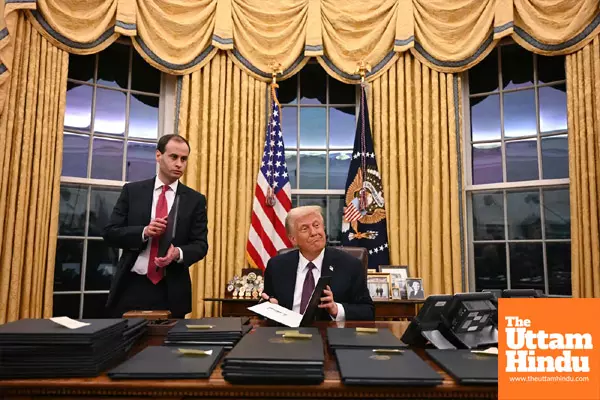Trump to Impose 25% Tariff on Canadian and Mexican Imports Over Border and Drug Issues

Washington (The Uttam Hindu): President Donald Trump has announced plans to implement a 25% tariff on imports from Canada and Mexico, effective from February 1, 2025. He asserts that these nations have not sufficiently addressed issues of illegal immigration and drug trafficking into the United States particularly concerning fentanyl. During a press conference in the Oval Office, Trump emphasized that the tariffs are a response to the "vast numbers of people" entering the U.S., specifically criticizing Canada's handling of the situation. The proposed tariffs could significantly impact the U.S. economy, especially the automotive industry which heavily relies on parts and vehicles imported from these countries.
Analysts from Bernstein have warned that such tariffs would be disastrous for American car manufacturers as they import a substantial volume of vehicles and components from Canada and Mexico. These tariffs also threaten to reignite trade tensions among the United States, Mexico and Canada who are signatories of the United States-Mexico-Canada Agreement (USMCA) a trade pact governing over $1.8 trillion (approximately ₹155.12 lakh crore) in goods and services exchanged annually between the three countries. Both Mexico and Canada have indicated their readiness to retaliate against U.S. goods if these tariffs are enacted. Canadian officials have reportedly prepared an initial list of approximately C$150 billion (around ₹9.03 lakh crore) worth of U.S.-made products that would face tariffs in response. The potential for a trade war looms large as both nations strive to address Trump's concerns regarding border security and drug smuggling.
In his inaugural address, Trump reiterated his intention to overhaul the U.S. trade system stating a preference for imposing tariffs on foreign nations rather than burdening American citizens with additional taxes. He has previously suggested that if Canada and Mexico do not take action to curb illegal immigration and drug trafficking he would consider implementing even broader tariffs on all foreign imports. As the situation develops, it remains uncertain whether these threatened tariffs will materialize or if they are part of a broader negotiation strategy aimed at eliciting concessions from Canada and Mexico ahead of the USMCA review scheduled for 2026. The potential economic fallout from such tariffs could be extensive, affecting prices for a wide range of consumer goods across the United States from groceries to automobiles.
- Tags
- #TrumpTariffs
- #USCanadaRelations
- #USMexicoRelations
- #TradePolicy
- #BorderSecurity
- #DrugControl
- #EconomicImpact
- #GlobalTrade
- #USImports
- #TariffPolicy
- #NorthAmericaTrade
- #TradeTensions
- #BorderIssues
- #InternationalRelations
- #EconomicSanctions
- #TradeReform
- #ImportTaxes
- #DrugCrisis
- #TradeConflicts
- #USForeignPolicy
- #Protectionism
